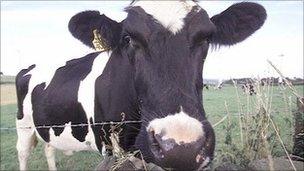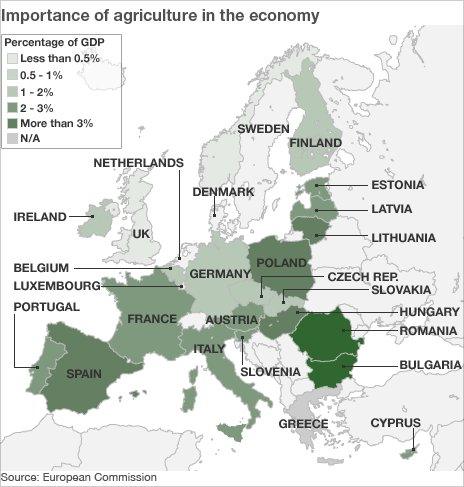Dairy farmer Gwyn Jones on Common Agricultural Policy reform
- Published
Why farmers need the Common Agricultural Policy
Daily Politics Soapbox: West Sussex dairy farmer and NFU vice-president Gwyn Jones, external explains why he believes the Common Agricultural Policy (CAP) is needed to keep Britain farming.
The CAP, provides support to farmers across Europe. It has been in existence around 50 years, and has provided crucial financial support for farmers and producers since it was created.
A lot of people ask why their taxes should go direct to farming when times are so tough. The simple answer, is so we can ensure that Britain is not reliant on importing food to feed the nation.
The CAP protects farmers against volatile markets, and ensures they do not go under when prices are low and at the same time maintain the countryside.
It is also important to remember that just because food prices are up at the moment, that farmers are not getting rich off the back of this.
High food prices do not necessarily mean that farmers are getting a fair price for their produce. Far from it.
Fair returns
The food supply chain is concentrated in the hands of a few large retailers and processors.
It does not work fairly for farmers, who are often left with a tiny fraction of the amount you pay at the supermarket.
And prices may be higher, but so are costs such as fuel and fertiliser.
For example, it was recently revealed that farmers in the UK dairy industry are paid the lowest amount for milk in Europe.

The CAP accounts for nearly half of the EU's annual budget
Without the CAP supporting the industry, many of us would have to stop farming, meaning less milk to go around, and you would see the price of milk, cheese and other dairy products shoot up.
Farmers need fair returns so that they can invest in their future production. The world needs more food to meet the growing global population and change in diets as a result of China and India's increased wealth.
We need to produce more food, but impact less on the environment and produce that food from fewer resources such as water, fertilisers and vital minerals. To lower farming's environmental footprint, farmers need to invest in their businesses.
Yet many farmers would struggle to make enough profit to survive without the CAP, let alone have anything spare to make those vital investments.
Promising proposals
Last week, the EU announced its plans for the reform of the CAP, external.
There were some promising proposals in it, things like trying to entice more young people into the industry, and an increased focus into research and innovation are very good ideas in principle.
But as ever, the devil is in the detail. Too many of the proposals, external are over complicated and will make a farmer's life overly difficult and may lead to an increase reliance on support in the future.
At the NFU, we feel it is a missed opportunity to help make farming more competitive and we are concerned that the level of bureaucracy that both farmers and the government will need to deal with will mean the system becomes unworkable.
According to the commission's own impact assessment report, the new environmental proposals will mean that more farmland will have to be set aside from production, and as a result European food prices could increase.
Retailers will quite rightly do all they can to make sure that consumers do not face the full brunt of those food price rises, and rather than take a drop in their own profitability, they will pass the pressure onto farmers.
In an ideal world, farming would not need the CAP. Farmers would be able to compete in the marketplace without the need of financial support. But the facts are stark and simple.
We face a growing world population and diminishing resources. With more mouths to feed, we need our farming industry to ensure that Britain can still produce enough food.
And that is exactly what the CAP should help to guarantee.
* Mr Jones will appear on Wednesday's Daily Politics around 1240 BST to debate the ideas in his film with Conservative MP Caroline Spelman and Labour's Chuka Umunna. The programmes runs on BBC Two from 1130 to 1300 and is available later on iPlayer.

- Published12 October 2011
- Published12 October 2011
- Published13 October 2011
- Published12 October 2011
- Published12 October 2011
- Published21 June 2011
- Published1 July 2013